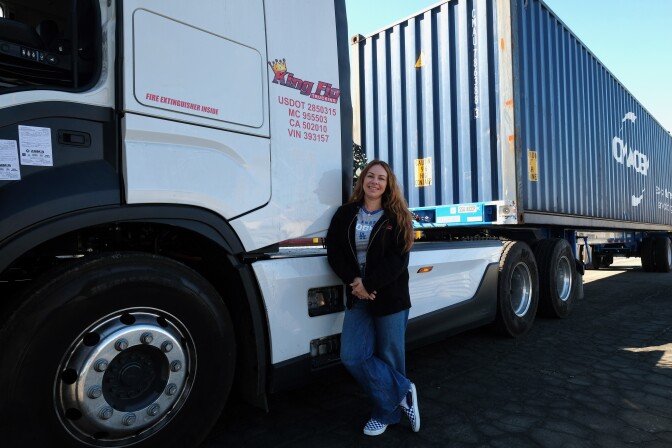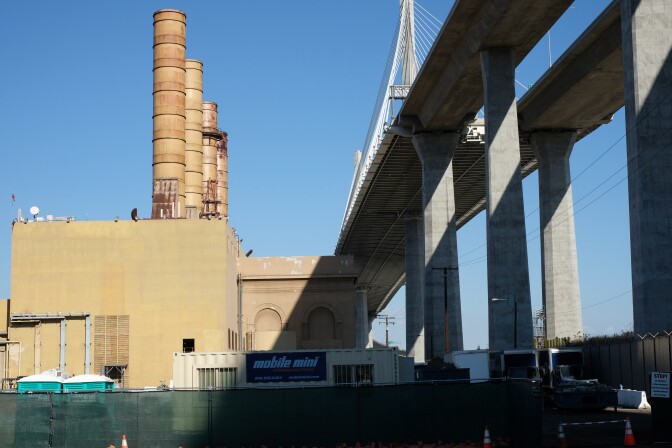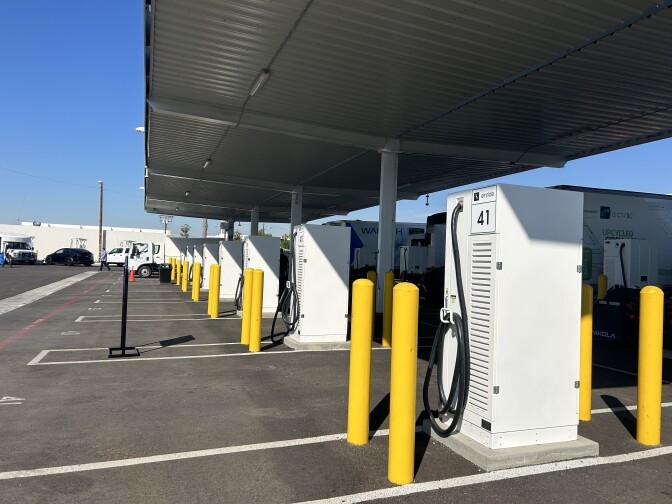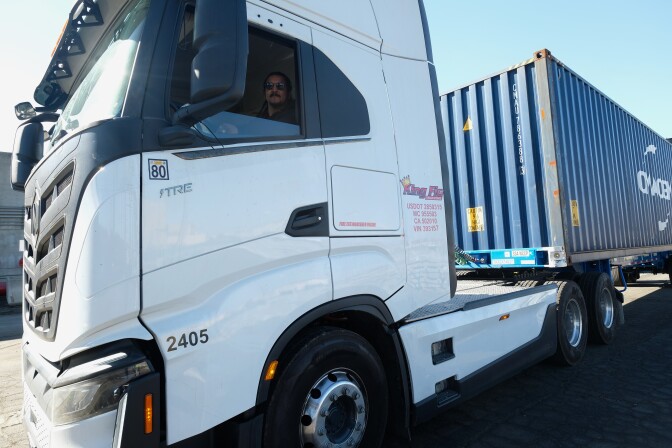As diesel trucks idle in line at a Port of Long Beach terminal, a big-rig electric truck pulls into a lot beneath one of the port’s towering bridges.
The lot will be the site of one of the largest electric truck charging depots in the state, charging up to 500 trucks a day by summer. The truck belongs to Jennie Abarca, owner of King Fio Trucking, a company based in Long Beach that moves shipping containers from the ports to Southern California warehouses.
Eight of the 32 trucks in Abarca’s fleet are now fully electric.
But a pause on a major California rule to phase out diesel trucks has left her feeling “betrayed” and uncertain about what’s next for the industry.
The past inspiring the future
Abarca grew up in Whittier, where her dad was a mechanic and auto shop teacher.
“So I've been around engines and trucks and grease and oil pretty much my whole life,” Abarca said.

She started in the trucking industry in her early twenties, working as a dispatcher for warehouses. Eventually, she met her husband while doing logistics for companies working the ports. A truck driver, he came from El Salvador to Southern California to build a better life.
As the saying goes, every trucking company started with one truck — about 15 years ago they bought their first and founded their own trucking business together.
“And King Fio was born,” Abarca said.
They named the company after Abarca’s grandfather, Fiorevanti Gianinno, the child of Italian immigrants, a World War II veteran and the man who moved her family from South Boston to Southern California.
“Talk about the American dream,” Abarca said.
Diesel trucks helped Abarca and her husband build their American dream, but she thinks it’s electric trucks that will sustain it long-term.
“I am very nervous about the climate, the air that we breathe, what my children are going to have to deal with,” Abarca said. “I feel it is my responsibility as a business owner, especially one who's causing the pollution, to do as much as I can.”
I feel it is my responsibility as a business owner, especially one who's causing the pollution, to do as much as I can.
Political tug-of-war
Abarca dove into figuring out how to transition her fleet after the California Air Resources Board unanimously passed a diesel truck phaseout rule in 2023. Among other things, the “Advanced Clean Fleets” rule requires all big-rigs serving the ports to be electric or hydrogen-powered by 2035 — the fastest timeline for trucks under the purview of the rule.
“Throughout my career I've seen other businesses go out of business because they weren't willing to change, and I don't want that to happen,” Abarca said. “We're in the beginning of our journey.”

Now, the state has pulled back on that rule.
California needed a waiver from the federal government to enforce the rule, which went into effect last year, requiring all new trucks registering to work the ports to be electric or hydrogen-fueled. But a week before President Donald Trump took office, the state Air Resources Board abruptly dropped its waiver request, citing the Trump administration’s opposition to previous waivers, such as one for the state’s clean car rules.
Abarca said the surprise shift made her feel “a little bit betrayed.”
“I feel like policymakers make these policies, but I have the hard job, right? I'm the one that has to actually make it a reality,” Abarca said.
Future funding unclear
The Trump administration is also seeking to end Biden-era legislation that provides incentives to build electric and hydrogen infrastructure as well as funding to help companies transition their fleets — potentially further disrupting the trucking industry.
Why it matters
Diesel semi trucks account for an outsized portion of California’s smog and planet-warming greenhouse gas emissions.
Diesel exhaust has been linked to higher risk of asthma and cancer in communities living near ports. And despite making up only 6% of the vehicles on California’s roads, medium- and heavy-duty diesel trucks spew one-quarter of the state’s on-road greenhouse gas emissions.
That’s why experts say transitioning to electric trucks can help significantly improve public health and reduce the pollution that’s driving worsening extreme weather and global warming.
In Southern California, home to the two of the largest ports in the nation, there’s a long way to go. Of the more than 15,000 trucks working the ports every month, about 430 are electric or hydrogen-powered. And while there are now more charging depots along major local trucking corridors and at the ports, a lot more are needed.
"Without shipper customer support, this [transition] is almost a non-starter. Without incentives, it is a definite non-starter,” said Matt Schrap, chief executive of the Long Beach-based Harbor Trucking Association, which represents the industry and opposes the rule as it's currently written.
He said if shippers are willing to pay more to trucking companies that invest in cleaner trucks, and financial grants and incentives remain, “then people will still look at [electric and hydrogen trucks] as a potential pathway here in the interim.”
To be clear, the effort was never just riding on federal funding. And state incentives remain, such as the greenhouse gas reduction fund, the state’s Carl Moyer program that provides grants to purchase cleaner engines and the Low Carbon Fuel Standard, which will now direct more money to medium and heavy-duty trucking.

Local incentive programs, such as a rule from the South Coast Air Quality Management District, fine diesel trucks entering warehouses and reward the use of cleaner technologies. And both the ports of L.A. and Long Beach say they are committed to a primarily electric and hydrogen future.
"Not much changes for us,” said Gene Seroka, executive director at the Port of Los Angeles. “These are multi-decade approaches. We just gotta chart the steady course. The difference being there probably won't be as much financial support from the federal and maybe state government.”
However, none of these programs actually mandate the switch to electric or hydrogen, like the Advanced Clean Fleets rule.

Uncertainty is bad for business
Schrap said the abandoned waiver request has led to relief for many of his members, who say the high cost of buying and running these trucks today makes the timeline unrealistic, and that infrastructure and range is not yet at the point it needs to be for the rule’s mandates to be achievable.
“I'm not going to sit here and say that the technology doesn’t work or that the technology is not evolving,” Schrap said. “It's just not evolving fast enough to keep up with the regulatory guidelines. If anything, this is a pause to go back to the drawing board.”

But the unexpected shift has pulled the rug out from other companies he works with.
For example, Schrap said some shippers who agreed to pay a premium to trucking companies with electric or hydrogen trucks in order to meet their sustainability goals are now backtracking on those agreements.
“The unfortunate thing that I'm hearing now is that some of these same customers have come back and said, 'Well, we don't have to do this now, right?'" Schrap said. " They want to talk a big game about sustainability, but they don't want to pay for it. We need certainty to be able to plan our businesses. ... We're just trying to help people understand that this is a break in the action.”
Choosing the path forward
Even for trucking company owners like Abarca who actually want to invest in electric trucks, the road hasn’t been easy.
Abarca said it was tough to find a lender willing to finance her electric trucks, which cost $300,000 to half a million dollars or more — as much as three times the cost of a diesel truck. Ultimately, Abarca was able to cover the upfront costs with state grants and financing through Volvo.
Abarca said her drivers love the trucks: they run great and have almost no maintenance. But so far the change isn’t helping her bottom line.

Some of the reasons include: The few existing charging depots are still expensive, costing the same or only a little less than diesel fuel, and the trucks take longer to charge, so she can’t run them as often as her diesel trucks. Despite local and state incentives, shippers and warehouses often don’t want to pay a higher fee to use her electric trucks, instead choosing to pass higher costs on to consumers.
“There's a disconnect between me who's doing the actual work and owns the vehicles, and then the bigger client,” Abarca said.
She does expect significant savings down the line, especially once she builds her own charging station at one of her truck yards in Lynwood. She expects to break ground on that project this summer.
“Then I will be able to apply for carbon credits and turn that energy, my own energy use, into actual physical dollars,” Abarca explained.
The state dropping the waiver request is likely to slow the transition for the industry as a whole, but Abarca said she’s committed to this path for her company and believes the momentum is still there.
“I feel like trucking as an entire industry is poised for an amazing technological advance, and I think this is just the first step,” Abarca said. “I mean, at one point, we were in carriages and horses. We've graduated from that. This is just another graduation. ... It is not a political thing for me. It doesn't really matter who's president. This is where we're moving.”














